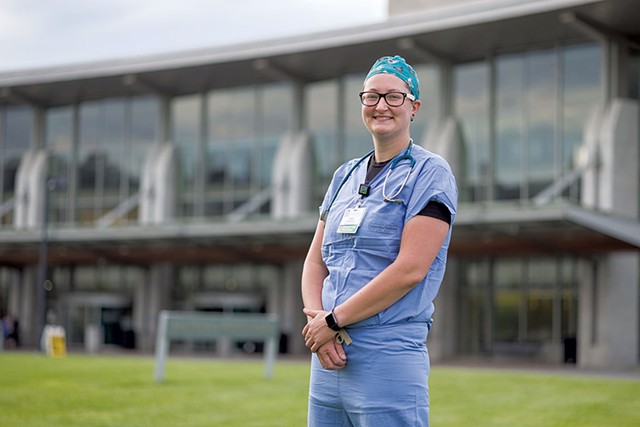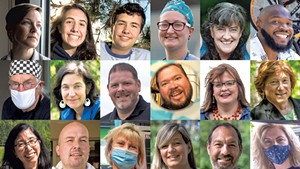
- Oliver Parini
- Cara Grogan, Respiratory therapist, University of Vermont Medical Center, Burlington
Cara Grogan had worked at the University of Vermont Medical Center for about three years when she decided to take a year off to be a traveling respiratory therapist in California. The then-30-year-old Hyde Park native assumed that she and her partner would spend the year exploring the West Coast; Grogan would work short stints at different hospitals while her partner attended a yoga retreat to get certified as an instructor.
"I gave my notice before really knowing that something was brewing," Grogan said, referring to the pandemic. By the time she arrived at her first assignment, at El Camino Hospital in Mountain View, Calif., in April 2020, "life just transformed for us."
Due to the nature of COVID-19, respiratory therapists, who specialize in treating patients with pulmonary diseases, were in high demand. They provide inhaled medications and gases, they keep patients' airways clear of obstructions, and they manage the medical equipment, such as ventilators and CPAP (continuous positive airway pressure) machines, that help patients breathe easier when their lungs won't function properly on their own.
Grogan's initial assignment at El Camino Hospital was supposed to last 13 weeks. Instead, she stayed on for nearly a year, caring almost exclusively for patients in the COVID-19 intensive care unit.
Early on, she recalled, there was a lot of concern "and even some panic," among staff about the availability of personal protective equipment to keep themselves safe.
"It was really scary, thinking about exposing my family and friends," she said. "I found myself trying to find ways to stay calm, because if you don't, it gets overwhelming."
Though some of Grogan's patients were elderly or had preexisting conditions such as diabetes, many were young and healthy before contracting the coronavirus.
El Camino Hospital calls itself "the hospital of Silicon Valley." But as Grogan explained, it also draws patients from immigrant and working-class communities, many of whom don't have the luxury to work remotely and who live in crowded housing where the disease can spread rapidly. At times, she said, "we had entire families in the ICU together."
But knowing another family member was in a nearby bed rarely made the experience easier for patients, Grogan said. Typically, COVID-19 patients in the ICU couldn't talk to each other or anyone else, especially if they were on respirators.
"Being in the ICU is scary enough. And not being able to breathe is really scary," she said. "Unfortunately, it's really busy, so staff can't sit with you. Even at the end of life, there's nobody in there with you. It was really depressing and sad."
Grogan and her partner lived in Groveland, Calif., a small town just outside of Yosemite National Park, about a three-hour drive from Mountain View. When Grogan went to work — typically, three 12-hour shifts each week — she stayed alone in a motel near the hospital for two nights before returning to the mountains. But even her alpine retreat could be stressful.
"It didn't help that there were a lot of wildfires where we were," she said. "We had to [evacuate] from the house and the town for a week."
Grogan was relieved when she finally returned to Vermont in March. Bradley Holcomb, manager of respiratory care, the pulmonary function lab and pulmonary rehab at UVM Medical Center, was glad to welcome her back.
Describing Grogan as "calm, positive, compassionate and dependable," he said, "I'm grateful to have her back on our respiratory team and in Vermont with us."
Still, Grogan took a month off before going back to work to decompress and process all the pain and suffering she witnessed.
"I think if you're not in health care, you don't understand the extent of what's happening," she said. "Professionally, it's great to challenge yourself and get any experience you can. But I wouldn't sign up for that again."











Comments
Comments are closed.
From 2014-2020, Seven Days allowed readers to comment on all stories posted on our website. While we've appreciated the suggestions and insights, right now Seven Days is prioritizing our core mission — producing high-quality, responsible local journalism — over moderating online debates between readers.
To criticize, correct or praise our reporting, please send us a letter to the editor or send us a tip. We’ll check it out and report the results.
Online comments may return when we have better tech tools for managing them. Thanks for reading.